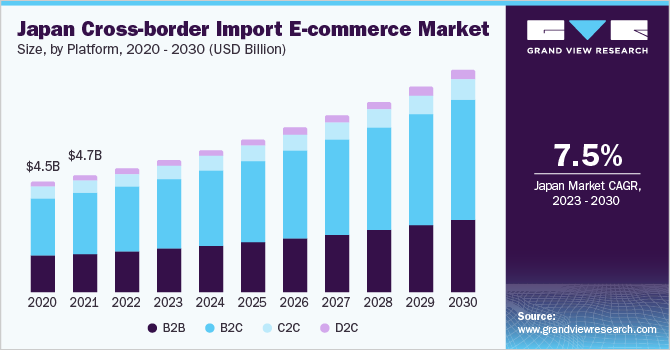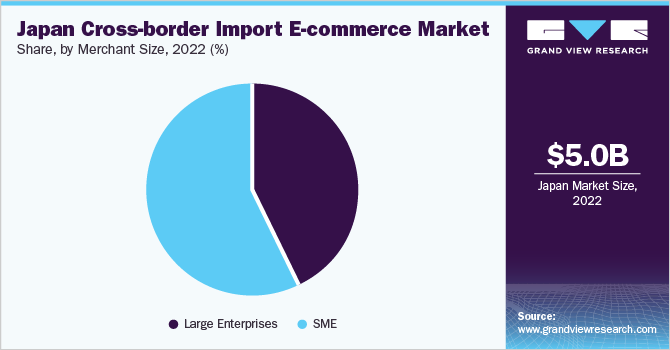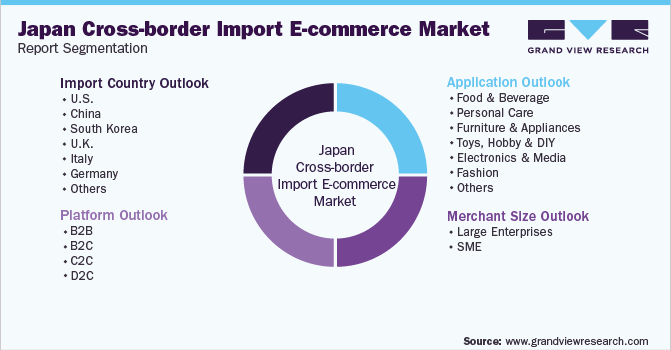- Home
- »
- Communication Services
- »
-
Japan Cross-border Import E-commerce Market Report, 2030GVR Report cover
![Japan Cross-border Import E-commerce Market Size, Share & Trends Report]()
Japan Cross-border Import E-commerce Market (2023 - 2030) Size, Share & Trends Analysis Report By Platform (B2B, B2C, C2C), By Merchant Size, By Application, By Import Country, And Segment Forecasts
- Report ID: GVR-4-68040-045-4
- Number of Report Pages: 100
- Format: PDF
- Historical Range: 2018 - 2021
- Forecast Period: 2023 - 2030
- Industry: Technology
- Report Summary
- Table of Contents
- Segmentation
- Methodology
- Download FREE Sample
-
Download Sample Report
Report Overview
The Japan cross-border import e-commerce market size was valued at USD 5,003.3 million in 2022 and is expected to expand at a compound annual growth rate (CAGR) of 7.5% from 2023 to 2030. Cross-border import e-commerce refers to the buying and selling of goods across international borders via online platforms. This type of e-commerce involves importing products from foreign countries to sell to customers in the domestic market. Japan’s cross border import e-commerce has become widely popular in recent years, as consumers have become more comfortable shopping online and are opting for a wider range of products at competitive prices. This rising trend has been accelerated by advancements in logistics, technology, and payment systems, which have made it easier and more efficient for businesses to import and sell goods from overseas.

Online shopping is becoming increasingly popular in Japan, due to various aspects including convenience, availability, and reasonable prices. The huge demand for foreign goods that are difficult to obtain in the domestic market is one of the primary drivers of cross-border e-commerce in Japan. Owing to their reputation for great quality and unique design, many Japanese buyers are interested in acquiring imported products, mainly from Europe and the United States. Japanese consumers have a considerable disposable income, which makes them attractive customers for businesses that provide relatively expensive or luxury products.
One of the major forces behind such an expansion is the surge in popularity of internet shopping in Japan, which has increased demand for imported goods. The Japanese government has also actively promoted international e-commerce and taken measures to improve customs procedures and minimized obstacles to the entry of foreign companies. However, some of the major restraints that Japan faces because of its variety of customs laws and import duties that might change based on the product and country of origin, importing goods into Japan can be a challenging process.
To encourage cross-border import e-commerce and expand market access, the Japanese government is encouraging international partnerships and collaborations between Japanese and overseas companies. Japanese consumers are increasingly using cross-border e-commerce websites such as Amazon.com, Inc., Rakuten Group, Inc., and Alibaba's Tmall Global to access a wide range of products from foreign merchants. Moreover, to improve customer experience in international e-commerce, the Japanese government is enforcing consumer protection laws and encouraging companies to offer detailed product information and customer service.
Adding on, the development of Japan's cross-border import e-commerce industry has increased demand for foreign goods, through Japanese companies’ greater access to foreign markets, and providing Japanese consumers with a better shopping experience. However, in the forecast period, it is anticipated that Japan's import cross-border e-commerce market will expand due to ongoing government support, a focus on innovation, and a commitment to customer satisfaction.
Platform Insights
The B2C segment dominated the market in 2022 with a revenue share exceeding 51%. The segment is anticipated to retain its dominance and lead the CAGR over the forecast period. This segment is attributed to the growth of Japanese international businesses, the rising demand for foreign goods among Japanese consumers, and government support for cross-border e-commerce have all played a crucial role in the growth of the B2C cross-border market in Japan.
The government's support for cross-import-border e-commerce is a major factor fueling the expansion of the B2C cross-border market in Japan. The Japanese government has implemented measures to improve logistics operations and lower customs barriers, making it simpler and more affordable for Japanese consumers to buy imported products. Additionally, the government actively promotes foreign partnerships and collaborations to help SMEs enter the market.
The B2B segment is predicted to witness significant growth at a CAGR of 7.1% over the forecast period. This can be ascribed to B2B cross-border import e-commerce market in Japan has witnessed a surge in demand due to the proliferation of commodities from international suppliers. The increasing adoption among Japanese businesses for high-quality and affordable products from foreign suppliers is one of the main factors driving the growth of the B2B cross-border import e-commerce industry in Japan.
Additionally, to increase their global supply chains, Japanese companies are using established B2B cross-border e-commerce platforms such as Alibaba's Tmall International and Amazon.com Inc., to acquire goods from foreign vendors.
Application Insights
The fashion segment held the largest revenue share in 2022, accounting for around 27.0% of the overall market. The cross-border e-commerce market in Japan is also growing in the fashion industry, as more and more businesses are looking to source clothing and accessories from overseas suppliers.
Import cross-border e-commerce platforms provide Japanese consumers with access to a wider range of products and brands around the world, enabling them to find the best fashion products and prices to meet their needs. Utilizing B2B cross-border e-commerce platforms, Japanese fashion companies can locate and acquire the most recent fashion trends and styles from foreign suppliers, by providing a competitive advantage in the market.
The food & beverages segment is predicted to witness a significant CAGR of 8.1% in the forecast period. Japan's food and beverages import e-commerce market is growing steadily, fueled by the increasing demand for international products among Japanese consumers.
The market has seen significant growth in recent years, as customers seek innovative and unique food and beverage options from around the globe, the market has experienced substantial growth in recent years. However, Japanese consumers are turning to e-commerce platforms to purchase products from overseas, as it offers greater convenience and access to a wider range of options than traditional brick-and-mortar stores.
Import Country Insights
The U.S. held the largest revenue share in 2022, accounting for around 31.4% of the overall market. The Japan cross-border import e-commerce market imports products from the United States being the second-largest source country for imports after China.
The most popular categories of products that Japanese consumers purchase from the United States through cross-border e-commerce include fashion and accessories, beauty and personal care, electronics, and food and beverages. Several popular cross-border e-commerce platforms, including Amazon, eBay, and Rakuten Global Market, are widely used by Japanese consumers to import goods from the United States.
China is predicted to witness significant growth at a CAGR of 9.3% over the forecast period. Most of the cross-border e-commerce imports into Japan originate in China. Fashion, accessories, personal care, electronics, and home appliances are the most popular product categories that Japanese customers buy from China through import cross-border e-commerce.
Japanese consumers use several well-known cross-border e-commerce websites, including Taobao Global, Joybuy, and AliExpress from JD.com and Alibaba. These platforms have allowed wider consumer access to a variety of Chinese goods for Japanese customers and have accelerated the expansion of cross-border e-commerce between the two countries.
Merchant-size Insights
The SMEs segment held the largest revenue share in 2022, accounting for around 57.0% of the overall market. SMEs in Japan are attempting to increase their customer base and enter into new international markets. B2B cross-border e-commerce platforms enable them to have access to cost-effective and affordable methods to source goods from foreign vendors and expand their market presence.
Small businesses in Japan are expected to see a continued increase in the import cross-border e-commerce market, which will be fuelled by rising globalization, the convenience of use, access to a broader variety of products, and reduced costs. The expansion of cross-border e-commerce is another initiative supported by the Japanese government, which is making it easier for Japanese small businesses to expand their global supply chains and obtain goods from other countries.

The large enterprise segment is predicted to witness a significant CAGR of 6.7% over the forecast period. The growth is attributed due to Japanese companies aiming to streamline their supply chain management procedures by sourcing goods from a wide range of vendors abroad.B2B import cross-border e-commerce platforms provide them with a convenient and efficient way to manage their global supply chains. Large Japanese companies are aggressively embracing digital transformation, increasing their use of B2B cross-border e-commerce platforms to purchase goods from foreign vendors.
Key Companies & Market Share Insights
Companies engage in inorganic growth strategies such as mergers & acquisitions, partnerships, and geographical expansion to stay afloat in the highly competitive market. For instance, in February 2023, Amazon Japan announced that it would expand the range of products and shipping options available through its cross-border e-commerce services. The business intends to add more than 1.5 million products to its online shop and provide shipping to more than 100 countries worldwide.
Moreover, in September 2022, Zozo announced that it will launch a new cross-border e-commerce platform in 2023. It aimed at offering customers from all over the world a limited selection of Japanese goods. The platform will initially focus on fashion and beauty products and is expected to offer shipping to over 200 countries worldwide. Some prominent players in the Japan cross-border import e-commerce market include:
-
Amazon.com, Inc.
-
Rakuten, Inc.
-
Kakaku.com, Inc.
-
Yahoo! Japan Corporation
-
Apple Inc
-
DMM.com, Ltd.
-
YODOBASHI CAMERA CO., LTD
-
Mercari, Inc.
-
ZOZO, Inc.
-
Qoo10 Pte. Ltd.
Japan Cross-border Import E-commerce Market Report Scope
Report Attribute
Details
Market size value in 2023
USD 5,362.5 million
Revenue forecast in 2030
USD 8.94 billion
Growth rate
CAGR of 7.5% from 2023 to 2030
Base year for estimation
2022
Historical data
2018 - 2021
Forecast period
2023 - 2030
Quantitative units
Revenue in USD million and CAGR from 2023 to 2030
Report coverage
Revenue forecast, company ranking, competitive landscape, growth factors, and trends
Segments Covered
Platform, merchant size, application, import country
Country scope
Japan
Key companies profiled
Amazon.com, Inc.; Rakuten, Inc.; Kakaku.com, Inc; Yahoo Japan Corporation; Apple Inc; DMM.com, Ltd; YODOBASHI CAMERA CO., LTD.; Mercari, Inc.; ZOZO, Inc.; Qoo10 Pte. Ltd.
Customization scope
Free report customization (equivalent to up to 8 analysts’ working days) with purchase. Addition or alteration to country, regional & segment scope.
Pricing and purchase options
Avail customized purchase options to meet your exact research needs. Explore purchase options.
Japan Cross-border Import E-commerce Market Report Segmentation
The report forecasts revenue growth at the country level and provides an analysis of the latest industry trends in each of the sub-segments from 2018 to 2030. For this study, Grand View Research has segmented theJapan cross-border import e-commerce market report based on platform, merchant size, application, and import country:

-
Platform Outlook (Revenue, USD Million, 2018 - 2030)
-
B2B
-
B2C
-
C2C
-
D2C
-
-
Merchant Size Outlook (Revenue, USD Million, 2018 - 2030)
-
Large Enterprises
-
SME
-
-
Application Outlook (Revenue, USD Million, 2018 - 2030)
-
Food & Beverage
-
Personal Care
-
Furniture & Appliances
-
Toys, Hobby & DIY
-
Electronics & Media
-
Fashion
-
Others
-
-
Import Country Outlook (Revenue, USD Million, 2018 - 2030)
-
U.S.
-
China
-
South Korea
-
U.K.
-
Italy
-
Germany
-
France
-
Canada
-
India
-
Mexico
-
Australia
-
New Zealand
-
Others
-
Frequently Asked Questions About This Report
b. The Japan cross-border import e-commerce market size was estimated at USD 5,003.3 million in 2022 and is expected to reach USD 5,362.5 million in 2023.
b. The Japan cross-border import e-commerce market is expected to witness a compound annual growth rate of 7.5% from 2023 to 2030 to reach USD 8.94 billion by 2030.
b. B2C held the largest share of over 51% in 2022 and is expected to dominate the Japan cross-border import e-commerce market, this can be due to the rapid adoption of B2C services in Japan.
b. Amazon.com, Inc.; Rakuten, Inc.; Kakaku.com, Inc; Yahoo Japan Corporation; Apple Inc; DMM.com, Ltd; YODOBASHI CAMERA CO., LTD. Mercari, Inc., ZOZO, Inc., Qoo10 Pte. Ltd. are some of the other players driving the Japan cross-border import e-commerce market growth.
b. One of the major forces behind the expansion and surge in popularity of internet shopping in Japan has increased demand for imported goods. The Japanese government has also actively promoted international e-commerce and taken measures to improve customs procedures and minimized obstacles to the entry of foreign companies.
Share this report with your colleague or friend.
Need a Tailored Report?
Customize this report to your needs — add regions, segments, or data points, with 20% free customization.

ISO 9001:2015 & 27001:2022 Certified
We are GDPR and CCPA compliant! Your transaction & personal information is safe and secure. For more details, please read our privacy policy.
Trusted market insights - try a free sample
See how our reports are structured and why industry leaders rely on Grand View Research. Get a free sample or ask us to tailor this report to your needs.










